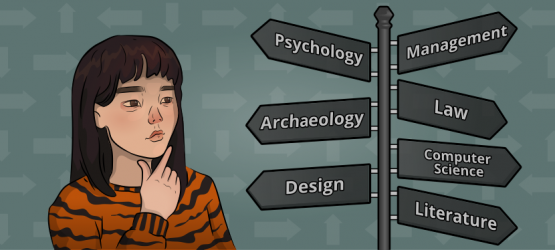The Hardest College Classes in 2023

College is a period of academic growth and discovery, and for many students, it is an opportunity to cognitively push themselves. While all college courses demand focus and work, some are infamously challenging, pushing students to their breaking point.
In this post, we will look at the most difficult college classes in the United States in 2023, as well as the disciplines that present the most intellectual hurdles to students. Based on credible sources and student comments, we have developed a list of ten tough courses that will put even the most dedicated students to the test.
1. Advanced Quantum Mechanics
Advanced Quantum Mechanics is a course that goes deeply into the intriguing and complicated area of quantum physics. This course addresses the deeper elements of quantum mechanics, pushing students to improve their grasp of the fundamental rules that control the behavior of matter and energy at the quantum level. It builds on the underlying concepts of introductory quantum mechanics.
One of the primary reasons Advanced Quantum Mechanics is regarded as a particularly difficult subject is its extensive dependence on advanced mathematics. Complex mathematical equations, such as linear algebra, problems with differential equations, and operator theory, are introduced to students. These mathematical skills are critical for comprehending and creating quantum mechanics’ mathematical framework, which is essentially abstract and necessitates a solid mathematical basis.
2. Organic Chemistry
One of the most difficult courses in the field of scientific education is considered to be Organic Chemistry. Many students seeking degrees in chemistry, biochemistry, pre-medical studies, and allied professions find it to be a considerable obstacle. The study of carbon-based compounds, including their structures, characteristics, reactions, and synthesis, is the main topic of this course.
There are various reasons why organic chemistry is challenging. Students must first and foremost get a thorough grasp of intricate chemical structures and how they interact. This entails knowing how various molecule configurations and functional groups impact reactivity and chemical behavior. In order to fully understand the complexity of organic molecules, it becomes essential to be able to perceive and manipulate three-dimensional structures.
3. Mathematical Analysis
A challenging area of mathematics that goes beyond the scope of the typical calculus curriculum is mathematical analysis, commonly referred to as advanced calculus. This course goes deeply into the theoretical underpinnings of calculus, thoroughly examining subjects like limits, continuity, differentiability, and integration.
It pushes learners to think critically, create solid arguments, and master complex problem-solving techniques. For mathematics and physics majors, mathematical analysis courses are frequently needed.
4. Human Anatomy
Due to their significant memorizing requirements and complex comprehension of the human body’s architecture and operations, human anatomy courses—typically taken by biology, pre-med, and health sciences students—present a difficult task.
Students must master difficult anatomical language, recognize anatomical structures using a variety of modalities, and appreciate how distinct bodily systems interact with one another. The course frequently has laboratory sections where students dissect cadavers to get practical experience.
5. Advanced Financial Accounting
In business and accounting degrees, financial accounting is an essential course. Advanced Financial Accounting raises the bar for complexity, nevertheless. Advanced accounting concepts and procedures, such as partnerships, consolidations, international accounting, and complicated financial statement analysis, are covered in this course.
Students must comprehend challenging accounting ideas, decipher challenging financial statements, and adapt accounting principles to actual situations. The training requires excellent problem-solving abilities, critical thinking, and attention to detail.
6. Algorithm Design and Analysis
Algorithm Design and Analysis is frequently seen by computer science students as a difficult topic. It investigates the creation, evaluation, and improvement of methods for handling challenging computational issues.
To create effective and scalable solutions, students study a variety of algorithmic strategies like divide and conquer, dynamic programming, and greedy algorithms. Data structure knowledge, mathematical reasoning, and the capacity to assess algorithmic complexity are all prerequisites for the course.
7. Principles of Microeconomics
Despite being an introductory subject, Principles of Microeconomics can be unexpectedly difficult for students owing to its complex concepts and analytical approach. Understanding resource allocation decisions made by people, businesses, and markets, as well as the factors that affect supply and demand, is a key goal of the course. In order to examine economic phenomena, students are brought into economic models, graphs, and mathematical tools.
8. Astrophysics
Astrophysics explores the study of celestial objects, the principles of physics as they are applied on cosmic sizes, and the physical processes that control the world. Students gain knowledge of how scientists collect information from far-off celestial bodies and analyze it to solve cosmic puzzles. Students explore the inner workings of stars and the processes that govern their genesis, development, and ultimate fate as the course unfolds.
The course delves into ideas like stellar development, stellar structure, nuclear fusion, and the life cycles of diverse star types. The methods by which new stars are born from interstellar gas and dust clouds are also covered.
Students studying astrophysics also look into the dynamics, categorization, and development of galaxies. They gain knowledge of the enigmatic phenomena known as dark matter and its part in determining the universe’s overall structure. The investigation of active galactic nuclei, black holes, and the complex interactions between galaxies may also be covered in the course.
9. Advanced Biochemistry
The main concepts of biochemistry are built upon advanced biochemistry, which delves further into the complexities of biomolecules, cellular functions, and biochemical pathways. They discover how metabolic imbalance may result in conditions like cancer and diabetes.
In addition, the course explores how genes are regulated and the processes that decide when and how they are active or repressed. Students study the signaling routes, transcription factors, and epigenetic alterations that are involved in the complex control of gene expression in many biological situations.
10. Neural Networks and Deep Learning
The advanced computer science course Neural Networks and Deep Learning concentrates on the concepts and usage of artificial neural networks. Students gain knowledge of synthetic neurons, activation mechanisms, and the forward and backward propagation rules.
Projects and assignments could include duties like generative modeling, natural language processing, or picture classification. Students examine cutting-edge research articles and investigate new developments in the field of deep learning throughout the course. They receive knowledge of the most recent developments in fields including AI, transfer learning, and deep reinforcement learning.
Conclusion
All the college courses covered in this article often pose a major problem for students that run across them when pursuing higher education. These courses call for commitment, tenacity, and a readiness to engage deeply with difficult subject matter.
As crucibles for intellectual growth and development, these demanding courses encourage students to deepen their understanding, refine their critical-thinking abilities, and cultivate resilience in the face of academic hardship. Although these classes’ complexity may at first seem intimidating, they also provide uncommon chances for academic and personal growth.
The difficulty of these courses also equips students for future careers in academia, the workforce, and research. A variety of job routes might benefit greatly from the talents developed by addressing these challenging courses, such as analytical thinking, problem-solving skills, and a strong work ethic.
In the end, going to college is a journey that involves both intellectual obstacles and personal development. Students can pave the way to academic brilliance and a lifetime love of learning by taking the most challenging college courses and persevering through their challenges.










